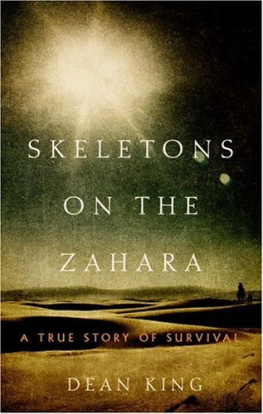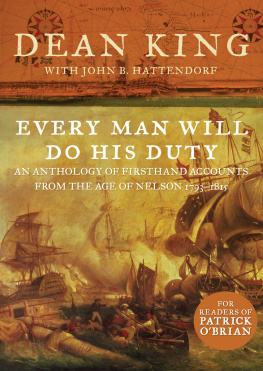Dean King - Skeletons on the Zahara: A True Story of Survival
Here you can read online Dean King - Skeletons on the Zahara: A True Story of Survival full text of the book (entire story) in english for free. Download pdf and epub, get meaning, cover and reviews about this ebook. year: 2004, publisher: Little, Brown and Company, genre: Detective and thriller. Description of the work, (preface) as well as reviews are available. Best literature library LitArk.com created for fans of good reading and offers a wide selection of genres:
Romance novel
Science fiction
Adventure
Detective
Science
History
Home and family
Prose
Art
Politics
Computer
Non-fiction
Religion
Business
Children
Humor
Choose a favorite category and find really read worthwhile books. Enjoy immersion in the world of imagination, feel the emotions of the characters or learn something new for yourself, make an fascinating discovery.
- Book:Skeletons on the Zahara: A True Story of Survival
- Author:
- Publisher:Little, Brown and Company
- Genre:
- Year:2004
- Rating:3 / 5
- Favourites:Add to favourites
- Your mark:
- 60
- 1
- 2
- 3
- 4
- 5
Skeletons on the Zahara: A True Story of Survival: summary, description and annotation
We offer to read an annotation, description, summary or preface (depends on what the author of the book "Skeletons on the Zahara: A True Story of Survival" wrote himself). If you haven't found the necessary information about the book — write in the comments, we will try to find it.
Skeletons on the Zahara: A True Story of Survival — read online for free the complete book (whole text) full work
Below is the text of the book, divided by pages. System saving the place of the last page read, allows you to conveniently read the book "Skeletons on the Zahara: A True Story of Survival" online for free, without having to search again every time where you left off. Put a bookmark, and you can go to the page where you finished reading at any time.
Font size:
Interval:
Bookmark:
Skeletons on the Zahara:
A True Story of Survival
Dean King
A Time Warner eBook
www.twbookmark.com
Copyright 2004 by Dean H. King
All rights reserved. No part of this book may be reproduced in any form or by any electronic or mechanical means, including information storage and retrieval systems, without permission in writing from the publisher, except by a reviewer who may quote brief passages in a review.
Little, Brown and Company
Time Warner Book Group
1271 Avenue of the Americas
New York, NY 10020
Visit our Web site at www.twbookmark.com
Maps by G. W. Ward
ISBN: 0-7595-0967-0
First eBook Edition: February 2004
Also by Dean King
AUTHOR
Patrick O'Brian: A Life Revealed
A Sea of Words
Harbors and High Seas
EDITOR
Every Man Will Do His Duty: An Anthology of Firsthand Accounts from the Age of Nelson, 1793-1815
Foreword
While researching a book in the library of the New York Yacht Club in Manhattan in the fall of 1995, I spotted an old leather tome with an intriguing title. It said simply Sufferings in Africa. I pulled this volume down and soon found myself lost in its musty pages. Though written in language and sentiment not far removed from the Puritan roots of its author, Connecticut sea captain James Riley, this true story of survival of shipwreck, captivity on the Sahara, and a long journey was powerful, touching, and extreme.The year was 1815. The War of 1812 had just come to an end, and the merchant brig Commerce set out with a crew of eleven, who held great hopes of restoring fortunes that had suffered during the war. The Commerce lost its way in fog and wrecked on the west coast of Africa, on the edge of the continent's Great Desert, a vast uncharted place said to be inhabited by cannibals. Instead, it was camel-riding Arab nomads who captured the starving sailors and introduced them to the strange and rigorous world of the bedouin, traveling from well to well in sweltering heat and sandstorms and living on camel milk. Despised and working as slaves, the sailors faced unimaginable hardships while trying to figure out how to get themselves off the desert and back to their families.Since at least Homer's day, such accounts of distant voyages, especially voyages gone bad, have mesmerized their audiences, reawakening them from domestic slumber to the world's wonders: its raging elements, its exotic and unyielding geography, its isolated peoples. The best of these accounts demonstrate anew man's ingenuity in the face of adversity, his will to survive, and, in the end, his intense desire to go home again.Riley's story did this and more. Like Richard Henry Dana Jr., in his American classic Two Years Before the Mast, Riley recounted his voyage with the candor of a man who had nothing to prove. Riley and his men were not professional explorers, like Cook and Banks or Shackleton. They were not sent to the desert like T. E. Lawrence or drawn to explore it like Wilfred Thesiger or Michel Vieuchange. The men of the Commerce were just going about the business of being merchant seamen when they were suddenly thrust onto the Sahara. Many of the crew left wives and children at home, who expected them to be back soon with wages much needed to right overdue accounts.Not burdened with the need to make history or fulfill the inflated expectations of a waiting public, Riley, like Dana, reflected a historical time and place with the greater clarity.Riley's story, published in New York in 1817, gained considerable notoriety, attracting such devotees as Henry David Thoreau, James Fenimore Cooper, and Abraham Lincoln. Lincoln held up Riley's narrative as one of the half dozen most influential books of his youth. But Riley's account had its detractors, skeptics who did not believe that what he wrote could possibly be true.Likewise intrigued and curious, I tracked down the memoir of another survivor of the ordeal, able seaman Archibald Robbins, whose 1818 account, though briefer, covered an even longer period of captivity. My own quest had begun. In Skeletons on the Zahara these two firsthand accounts have finally come together for the first time to tell the story of the wreck of the Commerce and the fate of her captain and crew. But I also felt compelled to go to the Sahara myself to help bring life to their amazing story after so many decades. Due to political conditions, unfortunate timing I arrived three weeks after 9/11 and the presence of land mines in Western Sahara, the former Spanish colony now controlled by Morocco, I was prevented from reaching many points of interest; however, what I found during my eight-hundred-mile trek on camels and in Land Rovers retracing Riley's route as best as I could through remote coastal desert was that a great many of Riley's and Robbins's descriptions of the people and conditions hold true today.In fact, the region remains so little explored and so little changed by modernity that scholars still cite Riley's observations accurate, with a few notable exceptions regarding the lives of the nomadic Sahrawis, their customs and beliefs, and the grueling nature of the western Sahara. Riley's is the rare case where disaster begat discovery, instead of the other way around.In Lincoln's day, Riley's account also spoke to a burning issue: the troubling institution of slavery. Inverting the American paradigm, it provided a useful perspective and helped expose the brutality of that abysmal practice. In our time, when one of the great challenges we face is to find common ground for Muslims, Christians, and Jews, the plight of the crew of the Commerce achieves a new relevance. It is my hope that the poignant story of the wreck of the Commerce and the journey to redemption of part of her crew will open our eyes anew, at least in some small part, to possibilities.PART TWO
Ships of the Sand
chapter 6
Purgatory
Font size:
Interval:
Bookmark:
Similar books «Skeletons on the Zahara: A True Story of Survival»
Look at similar books to Skeletons on the Zahara: A True Story of Survival. We have selected literature similar in name and meaning in the hope of providing readers with more options to find new, interesting, not yet read works.
Discussion, reviews of the book Skeletons on the Zahara: A True Story of Survival and just readers' own opinions. Leave your comments, write what you think about the work, its meaning or the main characters. Specify what exactly you liked and what you didn't like, and why you think so.













